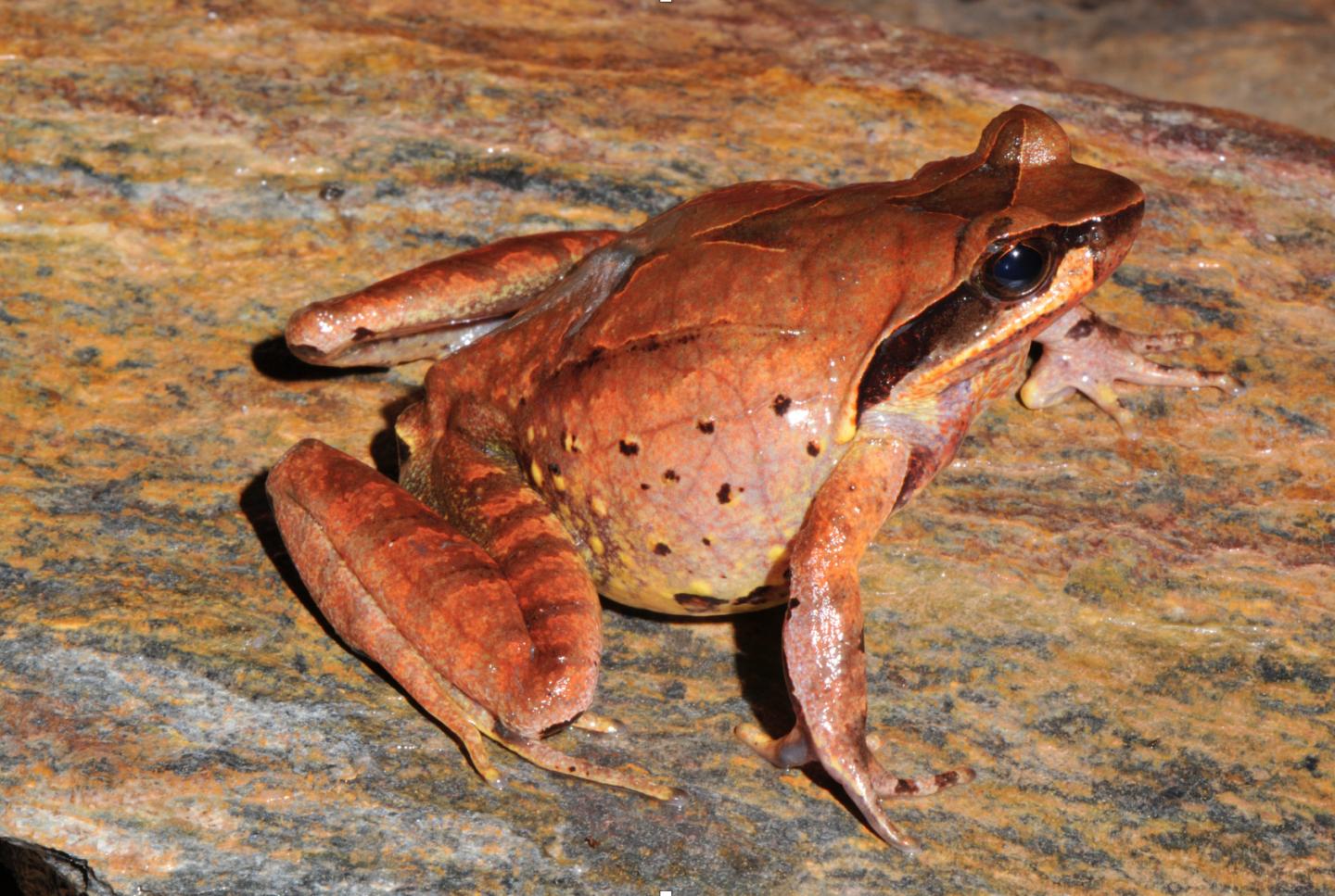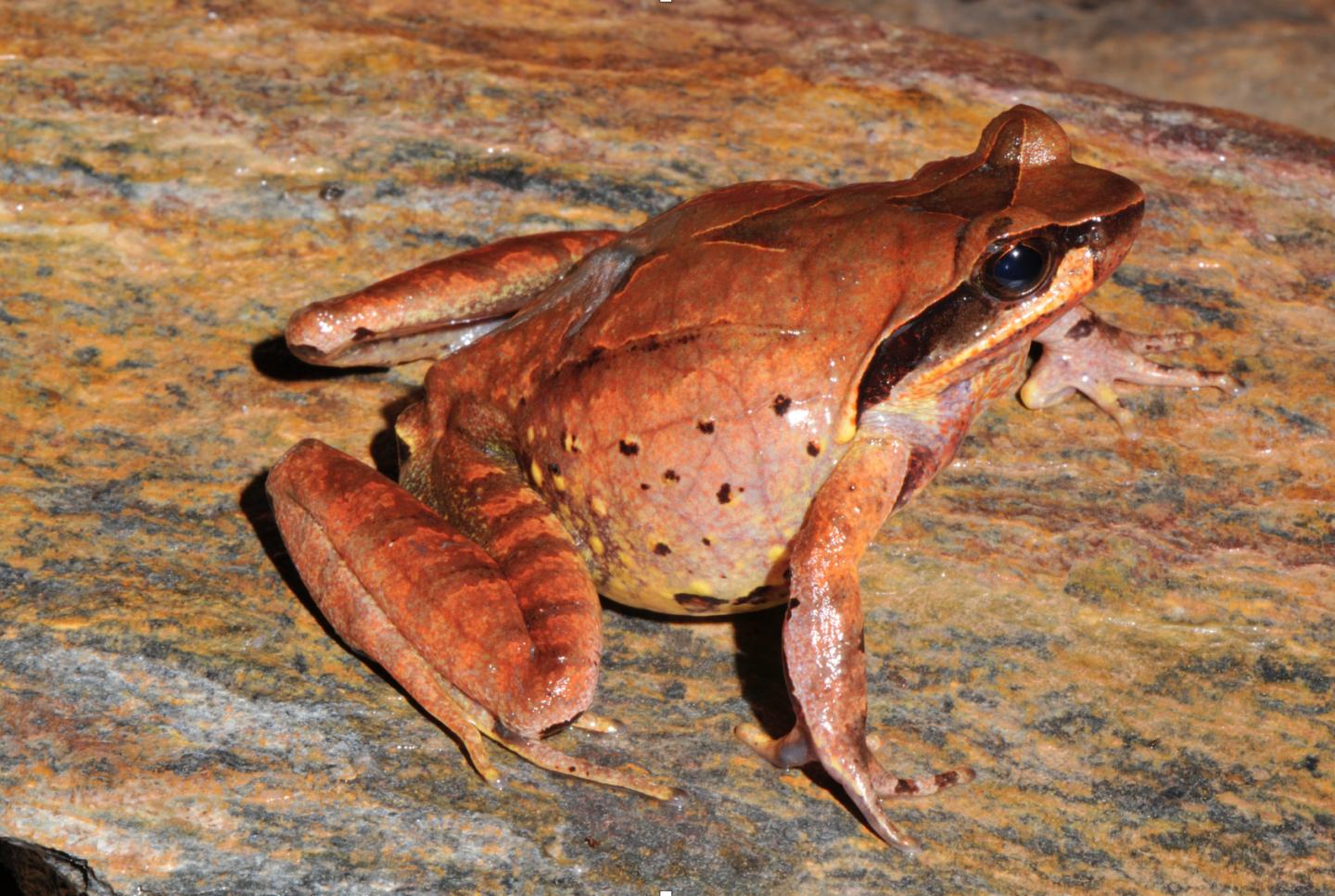
Credit: Photo by Systematics Lab
Asian Horned frogs account for approximately half of the ancient family of frogs called Megophryidae. This group was previously estimated to have originated 100-126 million years ago (mya). Frogs of this family hopped alongside the famed Velociraptors and other dinosaurs during the Cretaceous period (145-66 mya). Despite the fact that these animals have been around for a long time, little is known about their evolutionary history. Furthermore, unlike their dinosaur contemporaries, these frogs did not leave behind any known fossils. Methods using information from DNA sequences exist for estimating the age of origin for such groups of animals but these methods rely heavily on fossils of related animal groups, which could prove unreliable for these species.
New research recently published in the scientific journal, Molecular Biology and Evolution, by a team of scientists from Ireland and India resolved a 195-year old confusion regarding relationships between the species of Asian Horned Frogs, an enigmatic group of frogs often with horn-like projections over their eyes. Using DNA sequences, they discovered many potentially new species in this group previously unknown to science. They also estimated the ages of species and groups of species using a method that had previously not been tried on amphibians and inadvertently discovered that until now scientists may have been overestimating the age of many frog families. Their discovery may open a new chapter on how scientists interpret the evolutionary history of many animals that currently have no known fossil record.
"While this research particularly focused on frogs, many other animal groups also lack a fossil record, and so its very difficult to decipher their evolutionary histories. Our hope is that methods used here will prove beneficial for understanding how the distant ancestors of living animals may have coexisted in prehistoric times," explains lead author Dr. Stephen Mahony.
The research team was led by Ireland's leading herpetologist, Dr. Stephen Mahony (previously of University College Dublin [UCD], Ireland and University of Delhi [DU], India), and a prominent mammal molecular evolutionary biologist, Prof. Emma Teeling (UCD). A PhD student of Prof. Teeling, Nicole Foley (UCD), and the "Frogman of India", Prof. SD Biju (DU) were co-authors on this research publication.
The scientists demonstrated that a recently developed method called RelTime, that does not require fossil information, provided comparatively better age estimates for frogs. Their results correlate well with current knowledge on prehistoric biogeography–distribution of animals in space and time, considering tectonic plate movements, the rise of mountain ranges and palaeoclimatic changes–that may have influenced the evolutionary history of Asian Horned Frogs.
This research project was envisaged by Dr. Mahony in 2006 after he discovered that one widely distributed 'species' appeared to represent several similar but scientifically 'new' distinct species. Six of these species from Thailand, Cambodia and India, were formally described as new to science between 2009 and 2013 from his (and his colleagues) previous research. Since then, Stephen embarked on the most extensive research to have ever been carried out on this group of frogs. He did so by examining and measuring hundreds of specimens from museums in Asia, Europe and the US, and used DNA gene sequences to determine how these species are related.
Major discoveries:
These new results indicate that the Asian Horned Frogs family may have originated as recently as 77 million years ago in contrast to 100-126 mya as previously estimated, and suggest that scientists might have been also overestimating the age of many other families of frogs by up to 35%.
The results have completely changed our understanding of how the different Asian Horned Frog species and their species groups are related. Many of the species that look similar, and so were considered to be closely related, were found to be distant relatives of each other, and those that look different were found to be closely related.
Finally, the results of this research have identified numerous species in India, Vietnam and Laos that are very likely new to science, several of which may be restricted to small distributions in vulnerable habitats. This raises concerns for their continued survival as "having a name" is the bedrock for conservation.
"It is well known that Amphibians are one of the most endangered animal groups. Our research further demonstrates that many species remain undiscovered. Sadly, with climate change and continuing habitat destruction, we are losing many species before we can learn anything about them, but the use of molecular techniques is dramatically speeding up the learning process." says Mahony.
###
The research was funded by the Irish Research Council Embark Scholarship, European Research Council, Department of Science and Technology Purse Grant from the Government of India and Research and Development grants from the University of Delhi.
Publication:
Mahony, S., Foley, N.M., Biju, S.D., Teeling, E.C. (2017) Evolutionary History of the Asian Horned Frogs (Megophryinae): Integrative Approaches to Timetree Dating in the Absence of a Fossil Record. Molecular Biology and Evolution. DOI: https://doi.org/10.1093/molbev/msw267
Media Contact
Joseph Caspermeyer
[email protected]
480-258-8972
@OfficialSMBE
http://mbe.oxfordjournals.org/
############
Story Source: Materials provided by Scienmag




